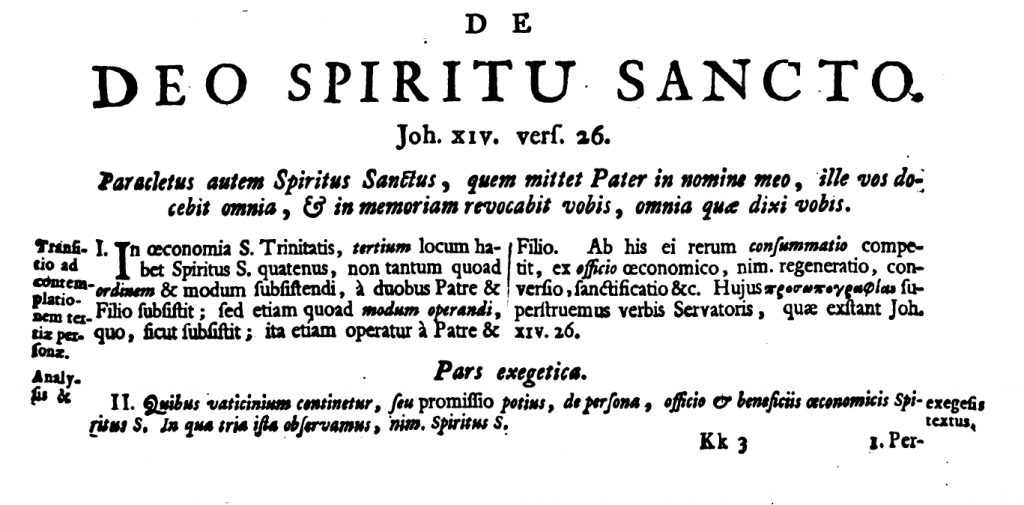Petrus van Mastricht’s Theoretical-Practical Theology (volume 2, chapter 27) has an excellent treatment of the Holy Spirit. I just want to unpack a little something he says in the introductory paragraph, before he gets to the main body of the pneumatology (in parts exegetical, dogmatic, elenctic, and practical). Here’s a little picture of the Latin, just to remind us all how grateful we should be to live in an age when the English translations are finally emerging.
Mastricht says that we affirm the Spirit “has the third place” for two related reasons. First, In “the order and mode of subsisting,” he subsists from the Father and the Son. Second, in the “mode of operating,” he operates from the Father and the Son. What this shows is that “just as he subsists, he also operates” (sicut subsistit, ita etiam operatur).
So we start at the highest level of trinitarian affirmation: The Holy Spirit is God, but is a particular person or hypostasis of God. That personal existence, or subsistence, is in God in a particular, relational way: eternally from the Father and the Son. Subsisting in that way, as third, he also operates in that way. But here’s the tricky bit: when Mastricht says “operate,” he is not yet talking about an outward work of the Trinity. It’s not an operation in that sense yet. Because “operation” can also refer to an inward, eternal operation. That inward operation is of course something we already know about: it follows the order of subsistence, meaning it aligns with the eternal relation of proceeding from the Father and the Son. All of this (origin, subsistence, operation) at the level of the eternal, internal, essential life of the triune God.
But the next step is a step toward us creatures by the Holy Spirit: “From these truths, to him belongs by economic office the consummation of things, namely regeneration, conversion, sanctification, and so forth.” The way the Spirit subsists in God shows up in the way the Holy Spirit carries out the divine works of redemption. Just as he is third, or we might say final, in the eternal order of perfect deity, he behaves thirdly or finally in the work of God. “To him belongs by economic office the consummation of things.”
This is where it helps if (like Mastricht) you’ve got your theology of the inseparable outward works of the Trinity up and running. Whatever God does, the whole Trinity does. So when we hear that consummation belongs to the Holy Spirit, we shouldn’t imagine that the Father and Son ran the first two laps of the race and then passed the baton to the Holy Spirit for the third lap. Instead, we should recognize the Spirit as the one who works inseparably with the Father and Son, but with the characteristic that we have to call something like thirdness. When the works of God are consummating (as in regeneration, conversion, and sanctification), the Spirit is operating there as he subsists: from the Father and from the Son as the final one within every act. And so the acts that shine forth most clearly as consummations are the acts in which the particular character of the Holy Spirit shines forth as well. He operates as he subsists, and the consummation of things belong to him by economic office.
As is often the case with scholastic theology, this seems like a long way (into the deep things of God) to go, just to get some insight into the character of the Holy Spirit’s work. But I think it pays off as we re-read the way the Bible speaks of the work of the Spirit, with an enriched understanding of the eternal background behind the Spirit’s temporal works.
